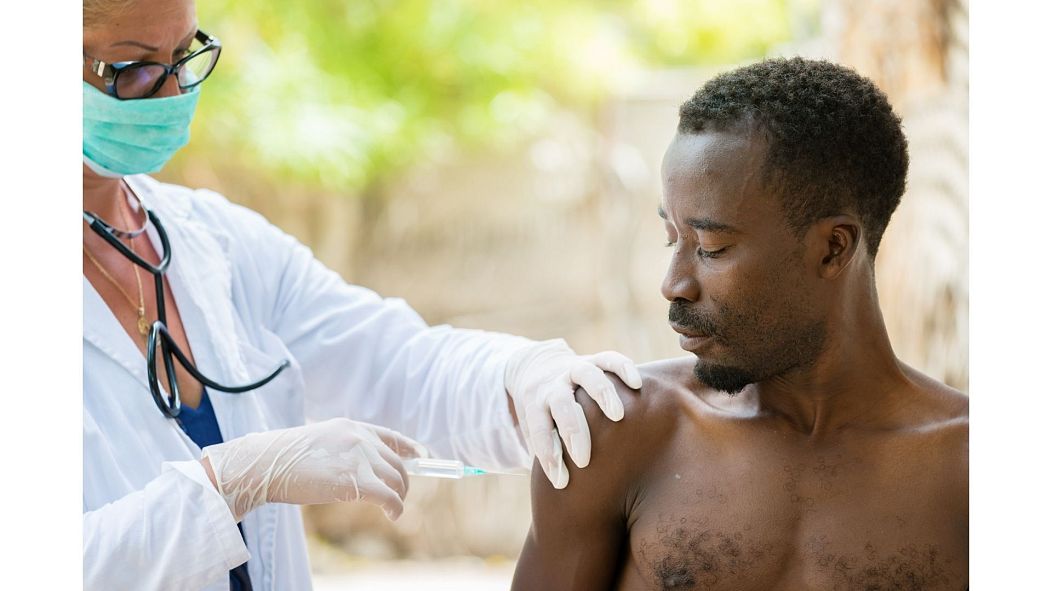As Europe rolls out COVID digital health IDs in the hope of getting back to normal, vaccine passports could leave developing countries left out.
The views and opinions expressed in this article are those of the author.
 ADVERTISEMENT
ADVERTISEMENT
 ADVERTISEMENT
ADVERTISEMENT
The new outbreaks of COVID-19 surging in Africa and other low-income regions are once again highlighting stark global inequities accessing vaccines and other options for battling the pandemic.
But now we are seeing this burden compounded by another form of inequality: the growing popularity of the COVID-19 or vaccine passport, such as the European Union’s new Digital COVID Certificate.
The push for the use of new pandemic-related health credentials is coming largely from developed countries where there is an understandable eagerness to blaze a path for re-booting damaged economies.
The credentials can include proof of vaccination, a negative COVID test, or proof of protection via a previous infection. The EU Digital COVID Certificate encapsulates all three.
An international crisis in the making
The problem is that it could be very difficult for people in low-income countries, even when they get vaccines, to meet the relatively rigid standards for compliance.
One potential result: the certificates will allow privileged people of developed countries to conduct business globally with relative ease while restricting the movement of others in ways that, over the long-term, will harm economic development precisely in regions where it is most urgently needed.
Credentials like the Digital COVID Certificate threaten to isolate regions like sub-Saharan Africa because to be trustworthy they require a complex "chain of trust" linking an individual to a verifiable test or vaccine.
For example, the EU’s system relies on a closed, digital infrastructure that allows special "digital signatures" linked to an individual’s COVID test or vaccine to flow from member state health systems through a "gateway" that connects them to a central database maintained by the EU Commission.
But it could take many countries years to comply with this standard.
It gets complicated because it’s not about fraudulent credentials or a lack of the technological capability to issue digital forms of ID, as that is now widely available.
The challenge revolves around tracing the test or vaccine attestation contained in the credential to a genuine clinical event—a jab administered following a vaccination protocol, or a test conducted per international standards. I have seen similar problems emerge in other forms of digital credentials.
Africa will again be left behind
My organisation ID4Africa accompanies African nations on their journeys to develop digital identification systems for social and economic development.
We help all involved explore the technical, ethical, and legal challenges of implementing fair and functional digital IDs - and to embrace what has come to be called "Good ID".
One of the biggest barriers to setting up these systems—and one that could greatly complicate digital health certificates - involves traceability, which for an official digital ID means documenting one’s birth event.
In Africa, not everyone has a birth certificate, and many struggle to trace their identity to the birth event.
That leads to a complicated and often costly quest to obtain a government issued digital ID number that, in a growing number of countries, is now essential for conducting financial transactions, gaining access to health services, getting a driver’s license, voting and other routine activities.
Satisfying the need for "traceability" can involve collecting multiple statements from community leaders or gathering evidence to present to a judge to stake a claim to their identity.
Our experience shows that this added friction can lead to serious exclusion of poor and marginalised members of society because they are the ones most likely to lack documentation.
A new form of global inequality
A similar exclusion, but on an even larger scale, could easily happen if a global system for health status is imposed on the developing world. Hundreds of millions of people could be locked out because they lack the traceability documentation required.
First, an international standard for establishing a genuine vaccination or test does not yet exist. And even when one is put in place, destination countries may refuse granting visas or entry for any travellers from countries lacking the infrastructure for certifying a large number of labs or tracing vaccine status.
Africa-based labs have made considerable progress, but many have not yet achieved accreditation via benchmarks established by the International Organization of Standardization (ISO).
For vaccines, the World Health Organization’s COVAX initiative has been rightly focused on achieving equality in access to vaccines and the capacity to administer them. Equality in vaccine traceability is not in their scope and trying to achieve it now would further complicate urgently needed immunisation campaigns.
A digital health certificate has appeal as an efficient and effective way to manage COVID-19 risks. But if we don’t pause now to consider the implications of getting it wrong and look for ways to get it right, these marvellous digital innovations could also be supremely effective at creating a binary world of those who can prove their COVID-19 risk status and those who cannot.
And that will institutionalise a new form of global inequality that will aggravate the impact of the pandemic, especially for people who already have suffered the most.
- Joseph Atick is the Executive Chairman of ID4Africa and an expert on identity matters.











